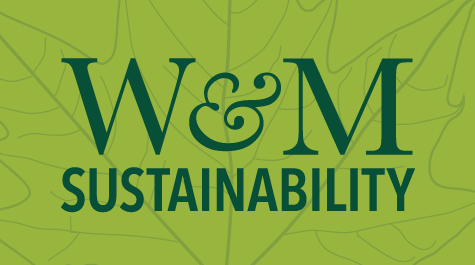Fall Green Fee projects announced
The William & Mary Committee on Sustainability has announced the fall 2017 Green Fee awards. A total of $48,366 will be dedicated to sustainability projects around campus this semester.
The Green Fee program began as a grassroots student initiative in 2008. Since then, it has funded hundreds of sustainability projects led by students, faculty and staff around the W&M campuses. This semester saw a wide variety of proposals, from campus-wide initiatives to innovative sustainability research projects. Some of this semester’s highlights included educational solar panels, and more efficient lighting to reduce greenhouse gas emissions around campus and at the Virginia Institute of Marine Science.
Reducing Electricity Usage and Improving Worker Safety at VIMS
$10,239 to Jaclyn Friedman Ph.D. ’21, and advisor Mark Brabham, director of facilities management at VIMS
This project, aimed to reduce electricity usage and improve working conditions, will replace 52 dated  energy demanding high-intensity discharge bulbs with new light-emitting diode lamps in three main buildings on the VIMS campus.
energy demanding high-intensity discharge bulbs with new light-emitting diode lamps in three main buildings on the VIMS campus.
Replacing bulbs that are in use 24 hours a day, seven days a week will drastically cut back on electricity usage, save money and promote more sustainable conditions at this world-class research facility. Not only will these bulbs be more energy efficient — consuming just 30 percent of the electricity currently being used — they have a higher light intensity, allowing for meticulous work, including ship repair and welding, to be completed under optimum conditions.
Branch Out Waste Reduction/Donation to FISH Inc.
$600 to Seema Sethi ‘18 and advisor Ellen Yates, OCE Fellow for Alternative Breaks
Branch Out sends students on several alternative service experiences domestically and internationally throughout the academic year. During this time, they are asked to purchase groceries, cook and eat together, which can entail a significant amount of paper and plastic waste from use of disposable bags and kitchenware. Organizers received funding last year for reusable mess kits and grocery bags in order eliminate this waste and promote a culture of sustainable living among participants.
Given the expansion of the program and the success of the implementation, this second funding award will allow Branch Out to purchase more materials to accommodate the growing number of participants it sends on alternative breaks at one time. The funding will also be, in part, be used for a donation of reusable grocery bags to FISH Inc., a local nonprofit and community partner that currently uses disposable plastic and paper bags to distribute materials to its clients. This donation is expected to help eliminate waste and encourage use of reusable grocery bags.
Recycling Bin Decals
$1,174 to Hope Wright ‘18 and advisor Eden Harris, associate director of marketing for Auxiliary Services
W&M's outdoor recycling bins currently display wording detailing what can be recycled in them, but the information is often incorrect. New decals will show in picture form what can be recycled.
 The decals will cover the tops of the bins, making it easy for students, faculty, staff and visitors to identify if their materials are recyclable. The goal of this initiative is to inform the W&M community about recycling and encourage sustainable practices in a way that is easy for the consumer.
The decals will cover the tops of the bins, making it easy for students, faculty, staff and visitors to identify if their materials are recyclable. The goal of this initiative is to inform the W&M community about recycling and encourage sustainable practices in a way that is easy for the consumer.
Law School Parking Lot Lighting LED Replacement
$26,353 to Farley Hunter, associate director of Operations and Maintenance
LED has emerged as the industry standard for both internal and external lighting. In parking lot applications, LED provides better light quality, greatly extended lamp life and reduced energy consumption relative to existing legacy lighting.
The Law School has metal halide lamps that will be replaced with LED fixtures to the extent the Green Fee award allows. A sector approach will be taken to ensure uniform lighting. W&M already specifies LED lighting for all new construction and has retrofitted a number of street lights with LED. This project will further the university’s commitment to efficient exterior lighting and will provide a highly visible example for all who visit the Law School.
Keck Lab Solar Panels for Education
$10,000 to Randy Chambers, director of the Keck Lab and Adrianna Gorsky, Keck Lab research assistant.
Building upon the success of the solar charging station on the terrace outside the Sadler Center, COS will provide matching funds for a solar array on the Keck Environmental Field Lab.
Once installed, electrical output from the panels will be used to help power the Keck Lab and will reduce the lab’s carbon footprint. Web links will also provide faculty and students the ability to monitor output in real time, and to examine the performance of individual arrays of panels. Given the visibility of the solar panels on the roof of the Keck Lab and the ability to explore their operation and efficiency, students and faculty will be more informed regarding photovoltaic opportunities for reducing the campus’ carbon footprint.
 Skip to main content
Skip to main content

